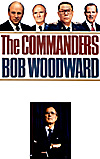 Simon & Shuster, 1991, ISBN 0-671-41367-8, $24.95, 398 pgs.
Simon & Shuster, 1991, ISBN 0-671-41367-8, $24.95, 398 pgs.
As befalls so many once-hot books, The Commanders fell into the discount bin and I picked it up for a few dollars. Indeed, the couple of bucks was well spent.
"Mr. Watergate" Woodward unveils the behind-the-scenes decision making within the White House and Pentagon from the election of George Bush Sr. to the beginning of the Gulf War. He centers on five main figures: Bush, Secretary of Defense Dick Cheney, Join Chief of Staff Colin Powell, Secretary of State James Baker, and National Security Advisor Brent Snowcroft. Together, these five forged the foreign policy that sent the US military into Panama and then the Persian Gulf.
Eminently readable, the look inside the process is fascinating. I don't purport to know whether this book is accurate down to the last detail. I certainly have my suspicions about some of the top-secret conversations that are in quotes. Overall, though, the intent and feel of the book seems right.
The two main episodes revolve around Panama and Saudi Arabia/Kuwait. The process and negotiations that went into the Gulf War are as unbelievable as they are depressing. Saddam came the proverbial "this close" to pulling the Kuwait invasion off without retribution and Bush, Cheney, and Powell shine in this episode. Ambassador Glaspie, for all her expertise and experience in the region, appears na´ve and pliable, as she repeats Saddam's lies.
In addition, there are a number of chapters when US forces were not sent--notably to the Philippines under Aquino.
What really comes across is the absolute chaos that results from a large-scale crisis. There are so many conflicting opinions, from multiple sources, and so much power politics in both civilian and military circles, it is often a wonder our government can act at all. You soon get an appreciation for Bush's efforts, and by Bush I mean the apparatus of the US government, to pull together a coalition of nations to battle an aggressor. The negotiations revolving around the UN resolution are a good example--persuading Russia not to veto the measure authorizing force to boot the Iraqis out of Kuwait.
The book ends as the Gulf War shifts from Operation Desert Shield to Operation Desert Storm. It may or may not provide an accurate look into governmental functions, but it's probably as good a look as any layman will see. Political actions dominate, with a few snippets of military information tossed in to cover some bases. For a couple of bucks, it's well worth your time to read, especially in conjunction with The Generals' War.
Back to List of Book Reviews: Modern
Back to Master Book Review List
Back to Master Magazine List
© Copyright 2001 by Coalition Web, Inc.
This article appears in MagWeb (Magazine Web) on the Internet World Wide Web.
Other military history articles and gaming articles are available at http://www.magweb.com